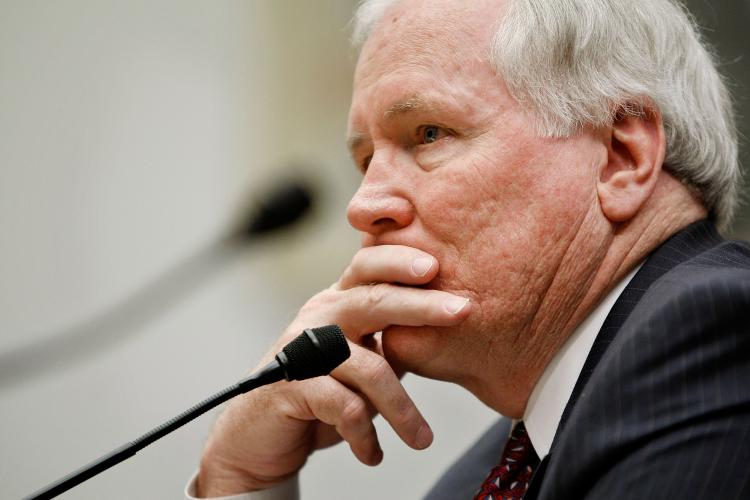NEW YORK—Embattled insurance company American International Group Inc (AIG) announced that its current CEO Edward “Ed” Liddy has offered to step down as soon as the company board finds someone to replace him in his role.
The decision will bring an end to Liddy’s short career, much like those of the four CEOs the company has had before him since 2005.
AIG announced a massive $62 billion loss on March 2, the largest loss ever taken by a corporation in history.
Liddy was under heavy public fire after his company, the recipient of over $182 billion in federal funds, paid $165 million in bonuses to company executives all over the world.
The insurance giant was bailed out by the government after its bets on derivatives failed and nearly pushed the company into bankruptcy. The company now needs to pay back $85 billion to taxpayers, and Liddy said the loans may take years to pay back.
Liddy said the company had made “substantial progress” in restructuring and reduced the “systemic risk that AIG presents to the global financial system.”
With the company in terrible shape, analysts wonder if anyone would want to take the top post at the ailing company.
But Liddy said in a media interview quoted by Bloomberg as saying that the company has “very strong internal candidates.” Bloomberg named AIG’s restructuring chief, Paula Reynolds, and Ace Ltd. CEO Evan Greenberg, son of former AIG CEO Maurice Greenberg, as possible candidates.
AIG was founded in 1919 in China by Cornelius Vander Starr as “American Asiatic Underwriters.” In 1962, Starr appointed Maurice “Hank” Greenberg as the head of the company’s crumbling North American operations. Greenberg eventually became CEO in 1968, and continued in his role until 2005, when he was charged by then New York attorney general Eliot Spitzer for fradulent business practice, accounting fraud and other violations.
The company has had five CEOs after Greenberg stepped down in 2005, but analysts say that AIG’s current problems were deep-rooted and were not the fault of the CEOs who took over the role after Greenberg.
Greenberg was appointed as a member of the Hong Kong Chief Executive’s Council of International Advisers in 1998, right after Hong Kong was returned to China under the Communist Party’s rule.
A Reuters article in March 2009 quoted Christopher Whalen, co-founder of Institutional Risk Analytics, as saying: “the bottom line is that Hank Greenberg wandered out of the very safe, well-capitalized world of insurance into the surreal world of credit default swaps where you can create endless amount of risk.”
In a testimony to Congress on March 3, 2009, Federal Reserve chairman Ben Bernanke said that AIG “operated like a hedge fund” and of all the bailouts the federal government had to undertake to fix the economy, rescuing AIG made him “more angry” than any other episode during the financial crisis.
The decision will bring an end to Liddy’s short career, much like those of the four CEOs the company has had before him since 2005.
AIG announced a massive $62 billion loss on March 2, the largest loss ever taken by a corporation in history.
Liddy was under heavy public fire after his company, the recipient of over $182 billion in federal funds, paid $165 million in bonuses to company executives all over the world.
The insurance giant was bailed out by the government after its bets on derivatives failed and nearly pushed the company into bankruptcy. The company now needs to pay back $85 billion to taxpayers, and Liddy said the loans may take years to pay back.
Liddy said the company had made “substantial progress” in restructuring and reduced the “systemic risk that AIG presents to the global financial system.”
With the company in terrible shape, analysts wonder if anyone would want to take the top post at the ailing company.
But Liddy said in a media interview quoted by Bloomberg as saying that the company has “very strong internal candidates.” Bloomberg named AIG’s restructuring chief, Paula Reynolds, and Ace Ltd. CEO Evan Greenberg, son of former AIG CEO Maurice Greenberg, as possible candidates.
AIG was founded in 1919 in China by Cornelius Vander Starr as “American Asiatic Underwriters.” In 1962, Starr appointed Maurice “Hank” Greenberg as the head of the company’s crumbling North American operations. Greenberg eventually became CEO in 1968, and continued in his role until 2005, when he was charged by then New York attorney general Eliot Spitzer for fradulent business practice, accounting fraud and other violations.
The company has had five CEOs after Greenberg stepped down in 2005, but analysts say that AIG’s current problems were deep-rooted and were not the fault of the CEOs who took over the role after Greenberg.
Greenberg was appointed as a member of the Hong Kong Chief Executive’s Council of International Advisers in 1998, right after Hong Kong was returned to China under the Communist Party’s rule.
A Reuters article in March 2009 quoted Christopher Whalen, co-founder of Institutional Risk Analytics, as saying: “the bottom line is that Hank Greenberg wandered out of the very safe, well-capitalized world of insurance into the surreal world of credit default swaps where you can create endless amount of risk.”
In a testimony to Congress on March 3, 2009, Federal Reserve chairman Ben Bernanke said that AIG “operated like a hedge fund” and of all the bailouts the federal government had to undertake to fix the economy, rescuing AIG made him “more angry” than any other episode during the financial crisis.







Friends Read Free